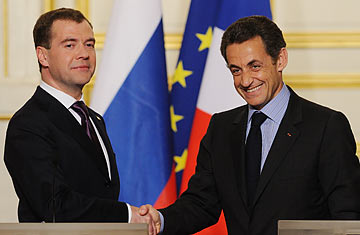
French President Nicolas Sarkozy, right, shakes hands with Russian President Dmitri Medvedev at a press conference at Élysée Palace in Paris
As Russian President Dmitri Medvedev wound up a three-day state visit to Paris on Wednesday, he had to be pleased with the results. After all, he virtually cinched an unprecedented military deal, bagged a significant gas contract and watched his French host, President Nicolas Sarkozy, dismiss American and European misgivings about his embrace of Moscow by treating Medvedev like his newest best friend forever. There wasn't a whole lot for the Russian leader not to love.
But what's behind Sarkozy's Russophile display? Most observers agree that it marks a rapid acceleration of the pragmatism that has been steadily influencing French policy toward Moscow and that it's a signal that Paris is ready to interact with Russia without the usual qualifiers. Gone are Sarkozy's early promises to make a respect of human rights and democracy central to all French foreign relations. Also gone is Sarkozy's former mocking of realpolitik as a political cop-out of cynical diplomats without principles. France is now eager to work with Russia on common security and economic interests — and it doesn't want to hear any sniping or criticism from other countries, s'il vous plaît.
That goes for military deals. On Monday, Sarkozy confirmed that France was negotiating with Russia over the sale of four Mistral-class assault ships worth a total of about $2 billion — the first deal of its kind between a NATO member and Moscow. It's turning heads for other reasons too. A Russian admiral recently said the amphibious vessels — which can carry 15 helicopters or 70 armored vehicles — would have allowed Russia to complete its August 2008 invasion of Georgia in a matter of hours. Little wonder, then, that the deal has prompted deep concern among American defense officials as well as among European Union members like Poland, Latvia and Lithuania, which fear that the warships could one day be used against former Soviet satellites like themselves.
Sarkozy, however, says such suspicions are outdated and that Europe and its allies need to focus on common threats to security. "How are we to say to Russian leaders, 'We need you for peace, like on Iran,' but then say, 'We don't trust you'? That would be totally inconsistent," Sarkozy tartly said on Monday night, when he was questioned by reporters on the sale. "We want to turn the page on the Cold War."
Selling Russia warships is certainly a nifty way of doing that. But some observers think the naval deal is being used as bait by Sarkozy to secure France wider-ranging business deals with Russia. During Medvedev's Paris trip, for example, the Russian energy giant Gazprom signed a contract with Paris-based GDF Suez to give the French company a 9% stake in the Nord Stream natural-gas pipeline and up to 1.5 billion cubic meters of gas by 2015. Nord Stream had previously been exclusively a Russo-German affair — one of many deals that other European countries and companies had signed with Russia in recent years, leaving France out in the cold.
"This is in large part Sarkozy sprinting to close the lead the Germans and Italians got early on by putting politics aside in order to cut energy deals with Russia," says Fabio Liberti, an expert on Russia and European affairs at the Institute of International and Strategic Relations in Paris. "Sarkozy also knows Europe's defense industry is still largely divided along national lines and appears destined for huge restructuring and consolidation. The nation with the biggest contracts out will get the biggest slice of that consolidated European pie — which is why neither the Mistral deal nor Russia as a military market should be underestimated."
But warmer Franco-Russian feelings notwithstanding, reminders of Russia's independence — and frequent defiance of the West — remained apparent this week in Paris. Following Sarkozy's rather fiery remarks that a France-Russia partnership could help establish a new hard line on Iran's nuclear program, Medvedev responded tepidly, saying, "We will concentrate all efforts on finding political and diplomatic solutions," which he added had "not been exhausted yet." For his part, Sarkozy noted during the visit that Russia has still not fulfilled the conditions of its 2008 cease-fire with Georgia.
Still, Liberti says Sarkozy's overtures may bear fruit in the longer run — especially considering the perceptions in both countries that the Obama Administration has little interest in Europe or Russia. "That's a gap in which Sarkozy could create a special Franco-Russian relationship, which over time could be expanded to establish a wider economic and security arrangement between Europe and Russia," Liberti explains. Such a development would behoove both sides — and mark a rare case of a good collective result arising from individual cynicism.
